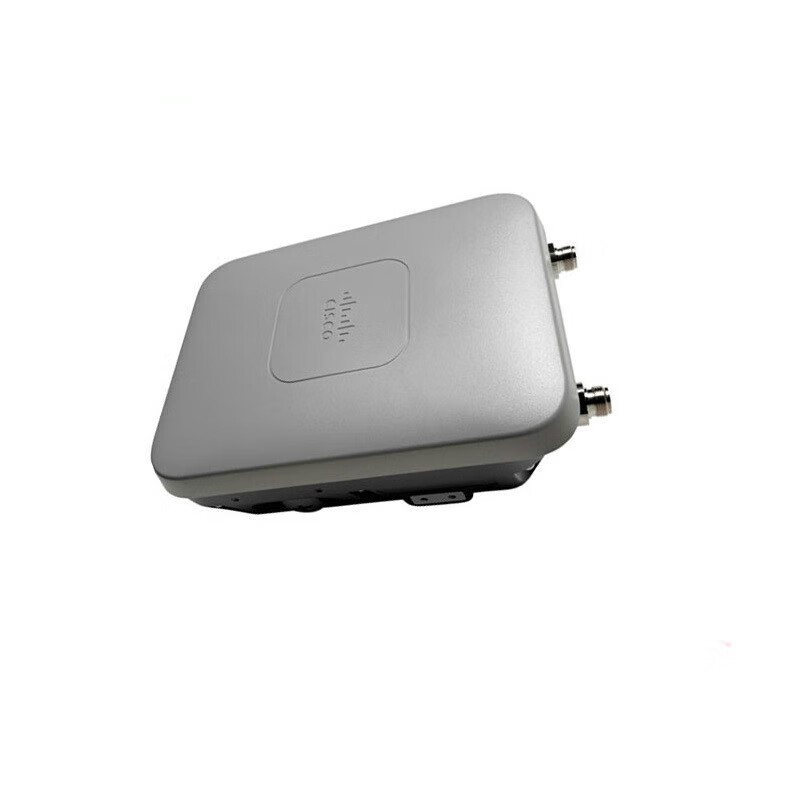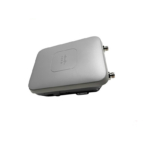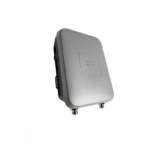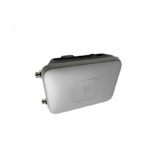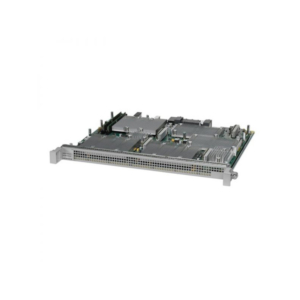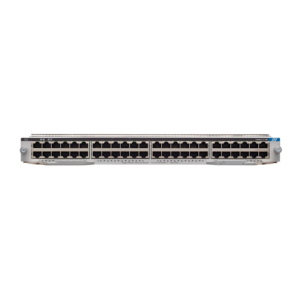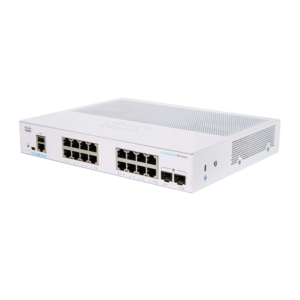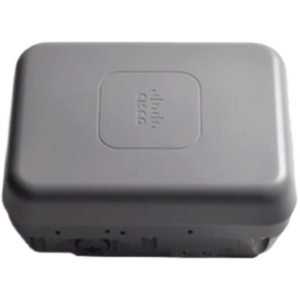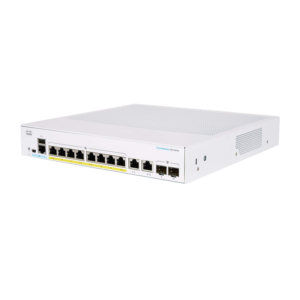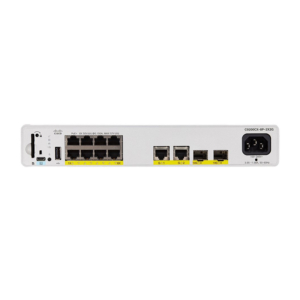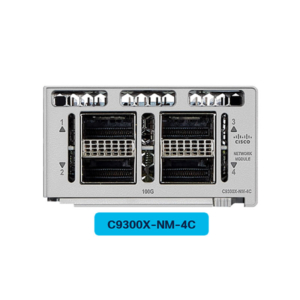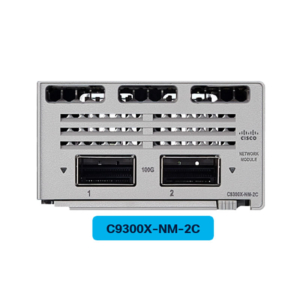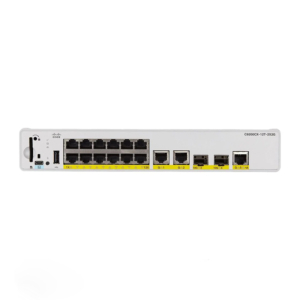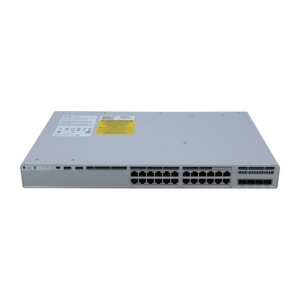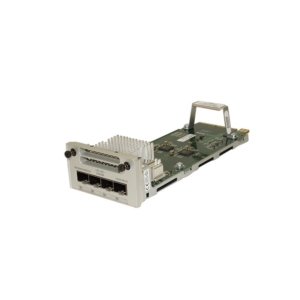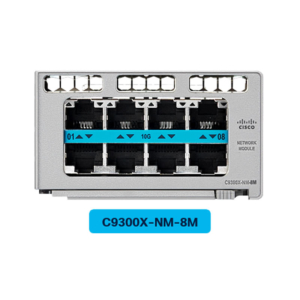Cisco®Aironet®1540 Series outdoor access points offer the latest 802.11ac Wave 2 functions in a rugged, ultra-low-profile housing that service providers and enterprises can deploy easily.
The Cisco Aironet 1540 Series is ideal for applications requiring rugged outdoor Wi-Fi coverage and supports the latest 802.11ac Wave 2 radio standard. Housed in a compact, aesthetically pleasing, easy-to-deploy package, the 1540 Series offers flexible deployment options for service providers and enterprise networks that need the fastest links possible for mobile outdoor clients (smartphones, tablets, and laptops) and wireless backhaul. The 1540 Series access points give network operators the flexibility to balance their desired wireless coverage with their need for easy deployment.
Whether deployed as a traditional access point or a wireless mesh access point, the 1540 Series provides the throughput capacity needed for today’s bandwidth-hungry devices.
Cisco Aironet 1540 Series Outdoor Access Points Data Sheet
Featuresandbenefits
By adhering to the 802.11ac Wave 2 standard, the 1540 Series provides a data rate of up to 867 Mbps on the 5-GHz radio. This exceeds the data rates offered by access points that support the 802.11n standard. It also enables a total aggregate dual-radio data rate of up to 1.1 Gbps. This provides the necessary foundation for enterprise and service provider networks to stay ahead of the performance expectations and needs of their wireless users.
In recent years corporate users have increasingly preferred wireless access as the form of network connectivity due to its convenience. With this shift, there is an expectation that wireless should not slow down users’ day-to-day work, but should enable a high-performance experience. The 1540 Series delivers this performance with highly secure and reliable wireless connections for mobile end users.
Table 1 lists the features and benefits of the 1540 Series.
Table 1.Features and benefits of Cisco Aironet 1540 Series
| Feature | Benefit |
| Compact size | Enables deployment of the access point where it’s needed. The 1540 Series easily mounts to walls or light poles without disturbing the aesthetics of the area. |
| 802.11ac Wave 2 radio | Provides up to 867-Mbps data rates with 2 x 2 Multiuser Multiple-Input, Multiple-Output (MU-MIMO) with up to two spatial streams. |
| Multiuser MIMO (MU-MIMO) | Allows transmission of data to multiple 802.11ac Wave 2-capable clients simultaneously to improve client experience. Prior to the 802.11ac Wave 2 standard, access points could transmit data to only one client at a time, typically referred to as single-user MIMO. |
| Flexible deployment modes | Allows for deployment in a variety of ways, including as traditional access points and in mesh networks. The access points can also be deployed with the Cisco Mobility Express Solution. This deployment is ideal for small to medium-sized networks that that require 50 or fewer access points without a physical controller. All deployment modes are easy to set up and configure. |
The Cisco Aironet 1540 Series offers the following features:
●Compact, lightweight size: At just over 2.5 pounds (1 kg) and with a small footprint, the 1540 Series is one of the smallest outdoor access points with internal antennas.
●Low power consumption: Achieves full operation on standard 802.3af power (13.9W).
●Integrated antenna options: The 1540 Series offers two models with different antenna patterns to address a variety of use cases.
Product specifications
Table 2 lists the specifications of the 1540 Series access points.
Table 2.Specifications
| Item | Specifications | |||||||
| 802.11ac Wave 1 and 2 capabilities | ●1542I/D: 2 x 2 MIMO with two spatial streams
●Multiuser and single-user MIMO ●Maximal Ratio Combining (MRC) ●802.11ac beamforming (transmit beamforming) ●20-, 40-, and 80-MHz channels ●PHY data rates up to 867 Mbps (80 MHz in 5 GHz) ●Packet aggregation: A-MPDU (Tx/Rx) and A-MSDU (Tx/Rx) ●802.11 Dynamic Frequency Selection (DFS) ●Cyclic-Shift-Diversity (CSD) support |
|||||||
| 802.11n (and related) capabilities | ●1542I/D: 2 x 2 MIMO with two spatial streams
●MRC ●20- and 40-MHz channels (40 MHz in 5 GHz) ●PHY data rates up to 300 Mbps ●Packet aggregation: A-MPDU (Tx/Rx) and A-MSDU (Tx/Rx) ●802.11 DFS ●CSD support |
|||||||
| Data rates supported | 802.11a: 6, 9, 12, 18, 24, 36, 48, and 54 Mbps
802.11b/g: 1, 2, 5.5, 6, 9, 11, 12, 18, 24, 36, 48, and 54 Mbps |
|||||||
| 802.11n data rates on 2.4 and 5 GHz: | ||||||||
| MCS Index | GI = 800 ns | GI = 400 ns | ||||||
| 20-MHz Rates (Mbps) | 40-MHz Rates (Mbps) | 20-MHz Rates (Mbps) | 40-MHz Rates (Mbps) | |||||
| 0 | 6.5 | 13.5 | 7.2 | 15 | ||||
| 1 | 13 | 27 | 14.4 | 30 | ||||
| 2 | 19.5 | 40.5 | 21.7 | 45 | ||||
| 3 | 26 | 54 | 28.9 | 60 | ||||
| 4 | 39 | 81 | 43.3 | 90 | ||||
| 5 | 52 | 108 | 57.8 | 120 | ||||
| 6 | 58.5 | 121.5 | 65 | 135 | ||||
| 7 | 65 | 135 | 72.2 | 150 | ||||
| 8 | 13 | 27 | 14.4 | 30 | ||||
| 9 | 26 | 54 | 28.9 | 60 | ||||
| 10 | 39 | 81 | 43.3 | 90 | ||||
| 11 | 58.5 | 108 | 57.8 | 120 | ||||
| 12 | 78 | 162 | 86.7 | 180 | ||||
| 13 | 104 | 216 | 115.6 | 240 | ||||
| 14 | 117 | 243 | 130 | 270 | ||||
| 15 | 130 | 270 | 144.4 | 300 | ||||
| 802.11acDataRates(5GHz) | ||||||||
| Spatial Streams | MCS | GI = 800 ns | GI = 400 ns | |||||
| 20 MHz | 40 MHz | 80 MHz | 20 MHz | 40 MHz | 80 MHz | |||
| 1 | 0 | 6.5 | 13.5 | 29.3 | 7.2 | 15 | 32.5 | |
| 1 | 1 | 13 | 27 | 58.5 | 14.4 | 30 | 65 | |
| 1 | 2 | 19.5 | 40.5 | 87.8 | 21.7 | 45 | 97.5 | |
| 1 | 3 | 26 | 54 | 117 | 28.9 | 60 | 130 | |
| 1 | 4 | 39 | 81 | 175.5 | 43.3 | 90 | 195 | |
| 1 | 5 | 52 | 108 | 234 | 57.8 | 120 | 260 | |
| 1 | 6 | 58.5 | 121.5 | 263.3 | 65 | 135 | 292.5 | |
| 1 | 7 | 65 | 135 | 292.5 | 72.2 | 150 | 325 | |
| 1 | 8 | 78 | 162 | 351 | 86.7 | 180 | 390 | |
| 1 | 9 | – | 180 | 390 | – | 200 | 433.3 | |
| 2 | 0 | 13 | 27 | 58.5 | 14.4 | 30 | 65 | |
| 2 | 1 | 26 | 54 | 117 | 28.9 | 60 | 130 | |
| 2 | 2 | 39 | 81 | 175.5 | 43.3 | 90 | 195 | |
| 2 | 3 | 52 | 108 | 234 | 57.8 | 120 | 260 | |
| 2 | 4 | 78 | 162 | 351 | 86.7 | 180 | 390 | |
| 2 | 5 | 104 | 216 | 468 | 115.6 | 240 | 520 | |
| 2 | 6 | 117 | 243 | 526.5 | 130 | 270 | 585 | |
| 2 | 7 | 130 | 270 | 585 | 144.4 | 300 | 650 | |
| 2 | 8 | 156 | 324 | 702 | 173.3 | 360 | 780 | |
| 2 | 9 | – | 360 | 780 | – | 400 | 866.7 | |
| Frequency band and 20- MHz operating channels (regulatory domains) | A:
2.412 to 2.462 GHz, 11 channels 5.280 to 5.320 GHz, 3 channels 5.500 to 5.580 GHz, 5 channels 5.660 to 5.700 GHz, 3 channels 5.745 to 5.825 GHz, 5 channels B: 2.412 to 2.462 GHz, 11 channels 5.180 to 5.240 GHz, 4 channels 5.260 to 5.320 GHz, 4 channels 5.500 to 5.720 GHz, 12 channels 5.745 to 5.825 GHz, 5 channels C: 2.412 to 2.472 GHz, 13 channels 5.745 to 5.825 GHz, 5 channels D: 2.412 to 2.462 GHz, 11 channels 5.745 to 5.865 GHz, 7 channels E: 2.412 to 2.472 GHz, 13 channels 5.500 to 5.580 GHz, 5 channels 5.660 to 5.700 GHz, 3 channels F: 2.412 to 2.472 GHz, 13 channels 5.745 to 5.805 GHz, 4 channels G: 2.412 to 2.472 GHz, 13 channels 5.745 to 5.825 GHz, 5 channels H: 2.412 to 2.472 GHz, 13 channels 5.745 to 5.825 GHz, 5 channels I: 2.412 to 2.472 GHz, 13 channels K: 2.412 to 2.462 GHz, 11 channels 5.280 to 5.320 GHz, 3 channels 5.500 to 5.620 GHz, 7 channels 5.745 to 5.805 GHz, 4 channels -I: 2.412 to 2.472 GHz, 13channels 5.180 to 5.320 GHz, 8channels L: 2.412 to 2.472 GHz, 13 channels 5.500 to 5.620 GHz, 7 channels 5.745 to 5.865 GHz, 7 channels M: 2.412 to 2.472 GHz, 13 channels 5.500 to 5.580 GHz, 5 channels 5.660 to 5.700 GHz, 3 channels 5.745 to 5.805 GHz, 4 channels -N: 2.412 to 2.462 GHz, 11 channels 5.745 to 5.825 GHz, 5 channels -Q: 2.412 to 2.472 GHz, 13 channels 5.500 to 5.700 GHz, 11 channels -R: 2.412 to 2.472 GHz, 13 channels 5.260 to 5.320 GHz, 4 channels 5.660 to 5.700 GHz, 3 channels 5.745 to 5.825 GHz, 5 channels -S: 2.412 to 2.472 GHz, 13 channels 5.500 to 5.700 GHz, 11 channels 5.745 to 5.825 GHz, 5 channels -T: 2.412 to 2.462 GHz, 11 channels 5.500 to 5.580 GHz, 5 channels 5.660 to 5.700 GHz, 3 channels 5.745 to 5.825 GHz, 5 channels -Z: 2.412 to 2.462 GHz, 11 channels 5.500 to 5.580 GHz, 5 channels 5.660 to 5.700 GHz, 3 channels 5.745 to 5.825 GHz, 5 channels |
|||||||
| Note:Customers are responsible for verifying approval for use in their individual countries. To verify approval that corresponds to a particular country, please visit https://www.cisco.com/go/aironet/compliance. | ||||||||
| Maximum number of nonoverlapping channels | 2.4 GHz
●802.11b/g: ◦20 MHz: 3 ●802.11n: ◦20 MHz: 3 |
5GHz
●802.11a: ◦20 MHz: 27 ●802.11n: ◦20 MHz: 27 ◦40 MHz: 13 ●802.11ac: ◦20 MHz: 27 ◦40 MHz: 13 ◦80 MHz: 6 |
||||||
 IT Network Equipment Supplier
IT Network Equipment Supplier

